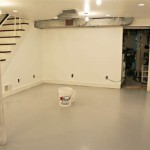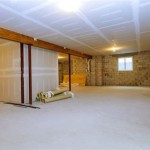Can a Basement Be Added to an Existing House?
Adding a basement to an existing house is a major renovation project that can significantly increase the value and livability of your home. However, it's important to consider the feasibility and costs involved before embarking on this undertaking.
Feasibility Factors
Determining if a basement can be added to your home depends on several factors, including:
- Foundation Type: The most suitable foundation types for basement additions are poured concrete or block foundations with footings that extend below the frost line.
- Soil Conditions: Excavating for a basement requires stable, well-drained soil. Poor soil conditions may require additional reinforcement or drainage measures.
- Water Table: The water table should be below the proposed basement floor level to prevent water seepage.
- Overhead Utilities: Overhead power lines or other utilities may interfere with the excavation process.
Construction Process
Adding a basement involves several key steps:
- Excavation: The first step is to excavate the area where the basement will be located to the required depth.
- Foundation Installation: The foundation is then poured or constructed using concrete or blocks.
- Wall Erection: Basement walls are typically made of concrete blocks, poured concrete, or ICF (insulated concrete forms).
- Floor Installation: The basement floor is typically a concrete slab that is poured on top of a gravel base.
- Waterproofing: Basement walls and floors must be waterproofed to prevent moisture penetration.
- Utilities Installation: Electrical, plumbing, and HVAC systems are then installed.
Costs and Timeline
The cost of adding a basement can vary widely depending on the size, structural complexity, and local construction costs. On average, it can range from $50,000 to $150,000 or more.
The timeline for basement construction can also vary, but typically takes several months to complete.
Benefits and Drawbacks
Adding a basement to your home offers several benefits:
- Increased Living Space
- Additional Bedrooms, Bathrooms, or Entertainment Areas
- Enhanced Home Value
- Improved Energy Efficiency
However, there are also some drawbacks to consider:
- Costly and Time-Consuming
- Potential Soil or Water Issues
- Limited Natural Light
- Possible Building Code Restrictions
Professional Consultation
Before deciding whether to add a basement to your existing home, it's highly recommended to consult with a qualified architect, engineer, and contractor.

Build A Basement Under An Existing House What You Need To Know

Adding A Basement To An Existing House Klier Structural Movers

Can You Add A Basement To An Existing House Reasons Steps

Can You Add A Basement To An Existing House

As Seen In Number One We Had To Create A Basement Which Later Was Connected The Of Existing Addition Safe Room Movie

Can You Add A Basement To An Existing House

Can You Add A Addition With Basement To An Existing House Google Search Building Home Plans

Maximize Living Space With Basement Excavation Serbu Sand Gravel

Can You Build A Basement Under An Existing House Basementing Com

Basement Addition Kings
See Also








